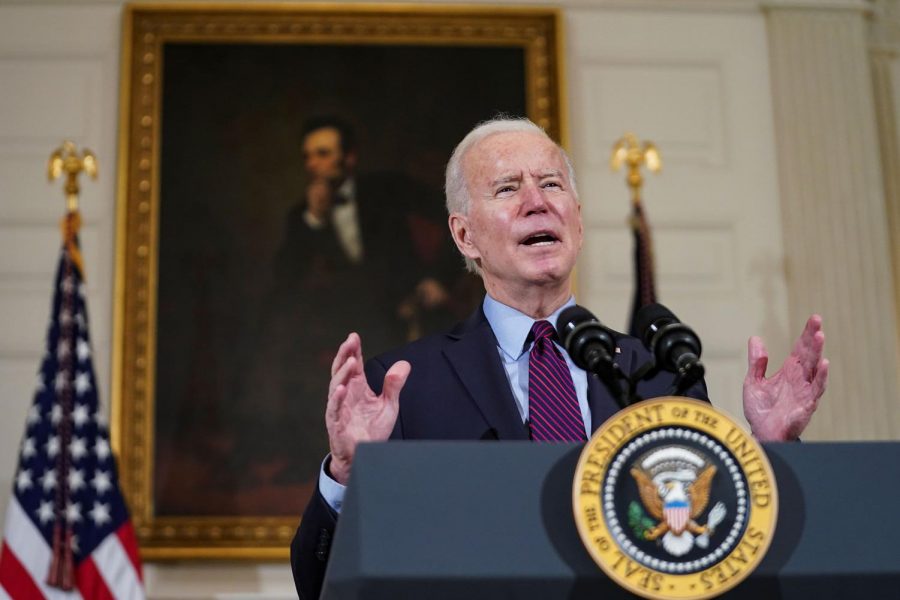Congress approves $1.9 trillion COVID-19 relief package
While speaking on the relief bill, Biden said that Americans will begin getting stimulus checks this month, as soon as The House passes the COVID-19 relief bill.
March 12, 2021
President Biden made combating the COVID-19 pandemic one of his top priorities within his first 100 days in office.
His plan for doing so included proposing a $1.9 trillion COVID-19 relief bill.
“The nation has suffered too much for much too long,” said Biden. “Everything in this package is designed to relieve the suffering, to meet the most urgent needs of the nation and put us in a better position to prevail.”
The bill included $1,400 stimulus checks, a $300 a week federal unemployment bonus, a per-child allowance of up to $3,600, and billions of dollars for vaccine distribution.
The bill has now passed in both the House and the Senate.
The large summation split the House along partisan lines. The ending vote was 219 to 212 with every Republican voting against the bill and two Democrats, Jared Golden and Kurt Schrader, joining them.
In the Senate, it passed on a 50-49 vote with every Republican voting “no” again.
The bill was controversial even among Democrats that supported its passing.
While preparing the legislation for the Senate, Sen. Joe Manchin wanted to “ensure that upper-income taxpayers are not eligible” for the payments, arguing they should start at $50,000 per person.
Conversely, Rep. Alexandria Ocasio-Cortez argued on Twitter that it was “shockingly out of touch” to assert that $50k is “too wealthy” to receive relief payments.
“Millions are on the brink of eviction. Give too little and they’re devastated. Give ‘too much’ and a single mom might save for a rainy day. This isn’t hard,” said Ocasio-Cortez.
Manchin’s amendment passed by a vote of 99-1.
The amendment follows President Biden telling Democrats that he wouldn’t compromise on the $1,400 payments. Biden said he was “not going to start [his] administration by breaking a promise to the American people,” NBC News reports.
Biden did however open the door to negotiating the income levels.
In the version of the bill passed by the Senate, individuals and couples making $75,000 and $150,000 respectively will receive payments.
The bill was expected to receive push back in the Senate due to widespread opposition from the congressional Republicans.
House Minority Leader Kevin McCarthy called the bill a “liberal pipe-dream,” and said Democrats were pushing the bill through without allowing the Republicans to insert their opinions.
One major point of contention was a provision to raise the federal minimum wage to $15 an hour over five years.
The minimum wage has remained stagnant at $7.25 since 2009.
Ultimately the provision failed in the Senate and was removed from the bill.
The Senate’s vote on amendments to the bill lasted over 25 hours.
The chair of the Congressional Progressive Caucus called the weeding out of provisions “bad policy and bad politics,” but granted that they were “relatively minor concessions” in the larger goal of providing aid to Americans.
Senate Majority leader, Chuck Schumer, also weighed on the bill’s passing in the Senate.
“They feel like we do, we have to get this done,” said Schumer. “It’s not going to be everything everyone wants. No bill is.”
Speaker of the House, Nancy Pelosi, wrote urging Republicans to join “the recognition of the devastating reality of this vicious virus and economic crisis and of the need for decisive action.”
Many Republicans still maintain that the bill was nothing more than a “spending spree” for Democrats. They argue that we have “hit a turning point in the pandemic” and the large budget is unjustifiable.
“The Senate has never spent $2 trillion in a more haphazard way,” said Senate Minority Leader Mitch McConnell. “Their top priority wasn’t pandemic relief. It was their Washington wishlist.”
The House will vote on the latest version of the bill on March 9, before it goes to President Biden for his signature.
Biden delivered a statement on the bill passing in Congress.
“When we took office 45 days ago, I promised the American people help was on the way,” said Biden. “Today, I can say we’ve taken one more giant step forward in delivering on that promise,” said Biden.
The bill will be the sixth round of federal government aid in response to the COVID-19 pandemic.
The bill can be seen as a major legislative victory for the Biden Administration.



